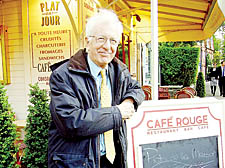 |
What price happiness? Not much cash at all
We have a better quality of life than 50 years ago, so why aren’t we content? Richard Layard tells the answers to Peter Gruner
Happiness: Lessons from a new science
by Richard Layard Penguin, £8.99 order this book
AT 72 teacher turned government adviser Lord Richard Layard of Highgate has good reason to be happy.
With his international best selling book Happiness just out in paperback – it is already published in 13 languages – suddenly this mild-mannered academic from the London School of Economics is flavour of the month.
Despite the catchy title, the book is not the usual New Age happy clappy psychobabble but the considered thoughts and common sense of a mature, Labour economist who argues that having happy contented people makes sound financial sense.
Lord Layard, founder and director of the LSE’s centre for economic performance, says: “More people are on invalidity benefit due to mental illness, than the total unemployed people in the country.”
A former history teacher at Woodberry Downs School in Hackney, he has written 25 books on economics which have inspired New Labour thinkers and more recently Tory leader David Cameron.
This book has broughtLord Layard international fame and a huge new readership and it is also the subject of a new BBC 2 documentary.
What inspired him to write it? He says: “Over the last 50 years, we in the west have enjoyed unparalleled economic growth.
“We have better homes, cars, holidays, jobs, education and, above all, health. But are we happier? Not in the least, and this worried me.
“Economics is all to do with growth and national prosperity. But what’s the point of more cash in the pockets if people are more miserable.
“More people suffer from dissatisfaction with their lives, anxiety and depression, and crime is another indicator of dissatisfaction.
“This is despite the fact that we know from psychologists and sociologists exactly what it is that makes people happy.”
Once people’s basic economic needs are met, he argues, additional income and wealth contributes little to an individual’s feeling of well-being.
“People are on a treadmill, working longer hours,” he adds. “There’s a race for more possessions, it has got to be bigger and better, and more status. They are desperately trying to keep up with the Joneses and the result is that they are burning themselves out.
“But psychological research now shows that the things that are crucial to feelings of happiness include close personal relationships, trust, and security.”
Of what he calls the “big seven” sources of happiness, three have improved: health, income and the quality of work. But some have deteriorated: family relationships, the strength and safety of communities, and the prevalence of unselfish values.
“Economic growth is important,” he said. “But we shouldn’t sacrifice other things which are equally important – for example human relationships.”
Layard’s brave new world would see taxes up for the rich, emotional intelligence and philosophy taught from an early age, more controls on advertising and TV shows that distort our understanding of what’s appropriate behaviour, including, presumably, Big Brother.
Some of the ways in which the government could make us happier, Layard believes, include promoting family-friendly practices at work, subsidising activities that encourage community life, eliminating unemployment and spending more money on treating mental illness.
According to Layard, mental illness is the largest single cause of misery in the Western world, contributing to more unhappiness than poverty, even when the link between poverty and depression is considered
He’s calling on the Department of Health to revolutionise the under funded NHS ‘Cinderella’ mental health section, and appoint thousands of therapists, in an effort to reduce the spiralling number of cases of anxiety and depression.
Layard believes that having a good spiritual life helps in the conquest of non-clinical forms of depression.
Personally he attends the Quaker meeting room in Highgate where members are able to sit quietly and meditate for periods of time. He is also interested in Buddhism, an essentially psychological practice that does not rely on a belief in God.
“Buddhists are very good on compassion,” he added. “They say if you feel better towards other people, you feel better towards yourself. “
I had to ask him the ultimate question. Is he happy? “I feel I’ve been lucky,” he said. “I’m doing things which are useful to other people like my writing. I’ve been very encouraged by response to the book; it seems to have hit a nerve. I have a loving wife and family and that’s very important.
“I also enjoy living in Highgate, which has a human scale and buildings of interest. I like our small shops and I would rather patronise them than go to a supermarket.
“I like our historical buildings and believe they a have a calming effect.”
|


